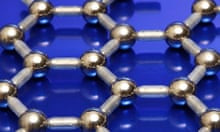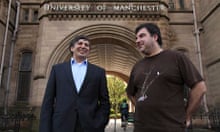Treasury ministers have been urged to back Britain’s world-leading research on graphene, the “wonder material” first discovered in Manchester, amid concerns the city’s university is set to lose £1m a year in EU funding after the UK’s vote for Brexit.
Leading scientists warned that Britain is likely to lose its place in the EU’s groundbreaking Graphene Flagship project, the biggest research scheme of its kind, following the result of the EU referendum last month.
Leaving the Europe-wide project would also mean losing £1m a year in funding for the University of Manchester, where the material was first isolated by two Nobel prize-winning scientists in 2004.
Andy Burnham MP, Labour candidate to be mayor of Greater Manchester, said: “EU membership was vital to the north-west and Manchester economy and that is why I have already asked Theresa May to plug any potential gaps.
“Europe helped to keep Manchester and our universities at the cutting edge of research and development, including funds to boost the National Graphene Institute [at the University of Manchester]. The new PM and chancellor must ensure that the UK government, not only the Chinese one, steps in and supports Manchester’s economy.”
The one atom-thick material is 200 times stronger than steel and conducts electricity better than any material known to man. It was first isolated by Konstantin Novoselov and Andre Geim, who won the Nobel prize in physics for their work in 2010.
Scientists believe graphene has thousands of potential commercial applications, including being used in the next generation of aeroplanes and high-speed trains.

Prof Robert Young, who leads the research project at the University of Manchester, raised concerns about the future of the EU funding as he announced new Chinese investment in the National Graphene Institute.
The deal, thought to be worth between £2m and £3m, is a five-year research partnership between China’s Beijing Institute of Aeronautical Materials and researchers in Manchester.
Young said there could be graphene-modified composites in aircraft within 10 years, including in the wings of Airbus planes made in Broughton, Chester.
With a budget of €1bn (£830m), the EU Graphene Flagship launched in 2013 and is Europe’s biggest ever joint research project with 150 groups across 23 countries.
Young said: “We have three researchers from the Graphene Flagship, which is a European Union project, and we’ve got two years’ funding on that that may not be renewed … We don’t know what’s going to happen.
“I guess the government might come up with some system where EU projects are funded by the UK government rather than money from the EU. I would urge them to continue that. UK universities do quite well out of European research funding – we get €1.60 for every €1 we put in. That’s a possible threat but we don’t know how that will pan out.”
Prof Richard Jones, a leading physicist and pro-vice-chancellor of research and innovation at the University of Sheffield, said: “The EU Graphene Flagship is a very big project and it’s not just Manchester, there are a number of other universities that benefit from it. It matters for money, but it also matters for those connections across Europe. I would be very worried indeed if I was in Manchester’s place about that.”
The Chinese investment comes as a delegation of Manchester’s business and civic leaders, including the council chief executive, Sir Howard Bernstein, and the council leader, Sir Richard Leese, fly to Beijing this week in an attempt to secure further Chinese investment in the city.
Manchester airport last year launched the first ever direct flight from the north of England to Beijing, which was unveiled by David Cameron and Xi Jinping during the Chinese president’s state visit to the UK in October.








